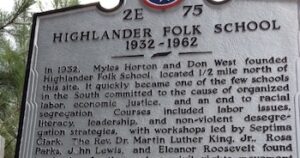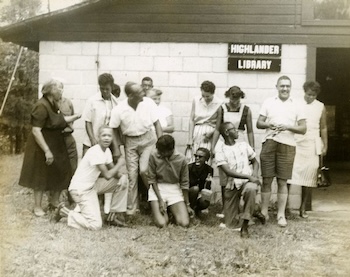
The Highlander Folk School plaque
*The Highlander Folk School was initially established on this date in 1932. Built in Grundy County, Tennessee, on land donated by educator Lilian Wyckoff Johnson, the institution was established to provide educational opportunities for individuals experiencing poverty and working people in Appalachia.
When Highlander was founded, the United States was in the midst of the Great Depression. Workers in all parts of the country faced significant resistance from employers when they attempted to organize labor unions, particularly in the South. Against that backdrop, Myles Horton and two others, West and Dombrowski, created the Highlander School "to provide an educational center in the South for the training of rural and industrial leaders, and for the conservation and enrichment of the indigenous cultural values of the mountains." Horton was influenced by observing rural adult education schools in Denmark, which were started in the 19th century by Danish Lutheran Bishop N. F. S. Grundtvig.
During the 1930s and 1940s, the school's focus was labor education and the training of labor organizers. In the 1930s, Myra Page taught here. From 1938 to 1953, the Highlander Folk School ran the Highlander Nursery School to provide no-cost early learning to the white working-class children of Summerfield, Tennessee. The Highlander Nursery School was a cooperative institution that relied on the material support and goodwill of residents, helping to build relationships with families who might have otherwise opposed the Highlander Folk School's pro-civil rights agenda. In the 1950s,
Highlander redirected its energies toward the growing issues of American civil rights and racial segregation. In addition to Myles Horton, Zilphia Horton, and others, a key figure during this period was John Beauchamp Thompson, a minister and educator who became one of the school's principal fundraisers and speakers. Highlander collaborated with Esau Jenkins of Johns Island to develop a literacy program for African Americans who were prevented from registering to vote because of literacy requirements imposed by the local government. The Citizenship Education Schools, coordinated by Septima Clark with assistance from Bernice Robinson, spread widely throughout the South and helped thousands of Black people register to vote.

Later, the program was transferred to the Southern Christian Leadership Conference (SCLC), led by Martin Luther King Jr., as the state of Tennessee threatened to close the school. Civil rights activists, most notably King Jr., James Bevel, Bernard Lafayette, Rosa Parks, John Lewis, and Julian Bond, came to the Center at different times. Lewis revealed later that he had his first meal in an integrated setting at Highlander. "I was a young adult, but I had never eaten a meal in the company of Black and white diners," the congressman wrote. He continued, "Highlander was the place where Rosa Parks witnessed a demonstration of equality that helped inspire her to keep her seat on a Montgomery bus, just a few weeks after her first visit. She saw Clark, a legendary Black educator, teaching side-by-side with Horton. For her, it was revolutionary. She had never seen an integrated team of equals working together, and it inspired her."
The civil rights anthem "We Shall Overcome" was adapted from a gospel song by Highlander music director Zilphia Horton, wife of Myles Horton, who drew inspiration from the singing of striking tobacco factory workers during the 1945–1946 Charleston Cigar Factory strike. It was revived at Highlander by Guy Carawan, who led the song to SNCC at their first convening at Shaw University. The song has since spread and become one of the most recognizable movement songs in the world. Highlander has been the target of violence and suppression numerous times since its founding as the Highlander Folk School in Monteagle, Tennessee, in 1932.
A backlash against the school's involvement in the American Civil Rights Movement led to the school's closure by the state of Tennessee in 1961. Their staff reorganized and moved to Knoxville, Tennessee, where they rechartered Highlander under the name "Highlander Research and Education Center." Highlander has been in its current (and longest consecutive) home in New Market, Tennessee, since 1971. The Highlander archives are housed at the Wisconsin Historical Society and the Louis Round Wilson Library at the University of North Carolina at Chapel Hill.